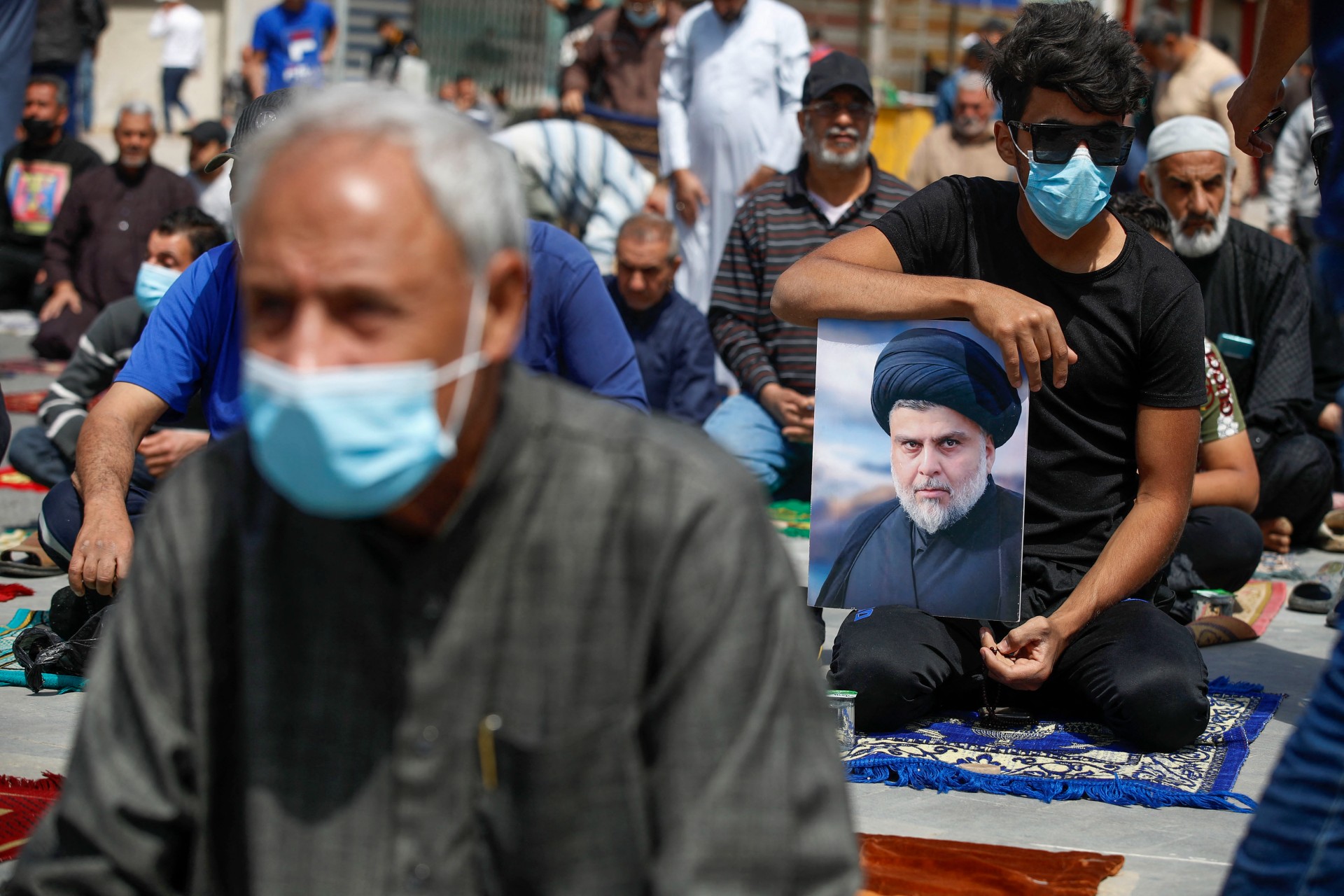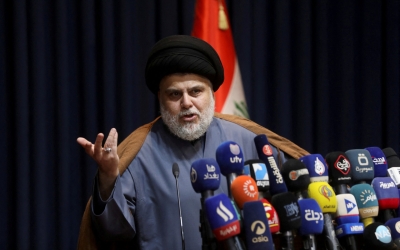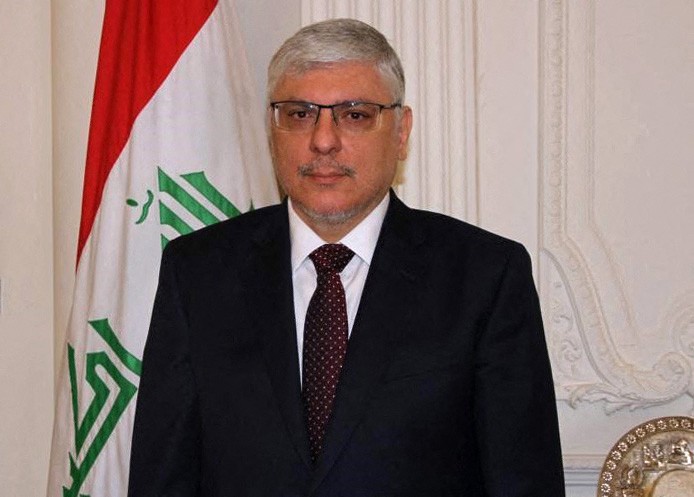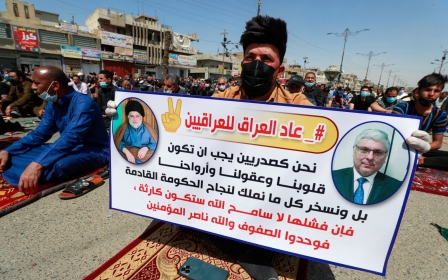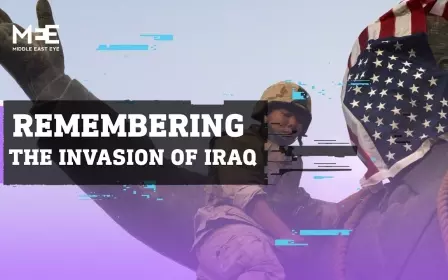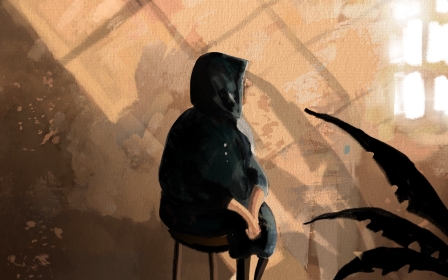How foreign powers are being sucked into Iraq’s political stalemate
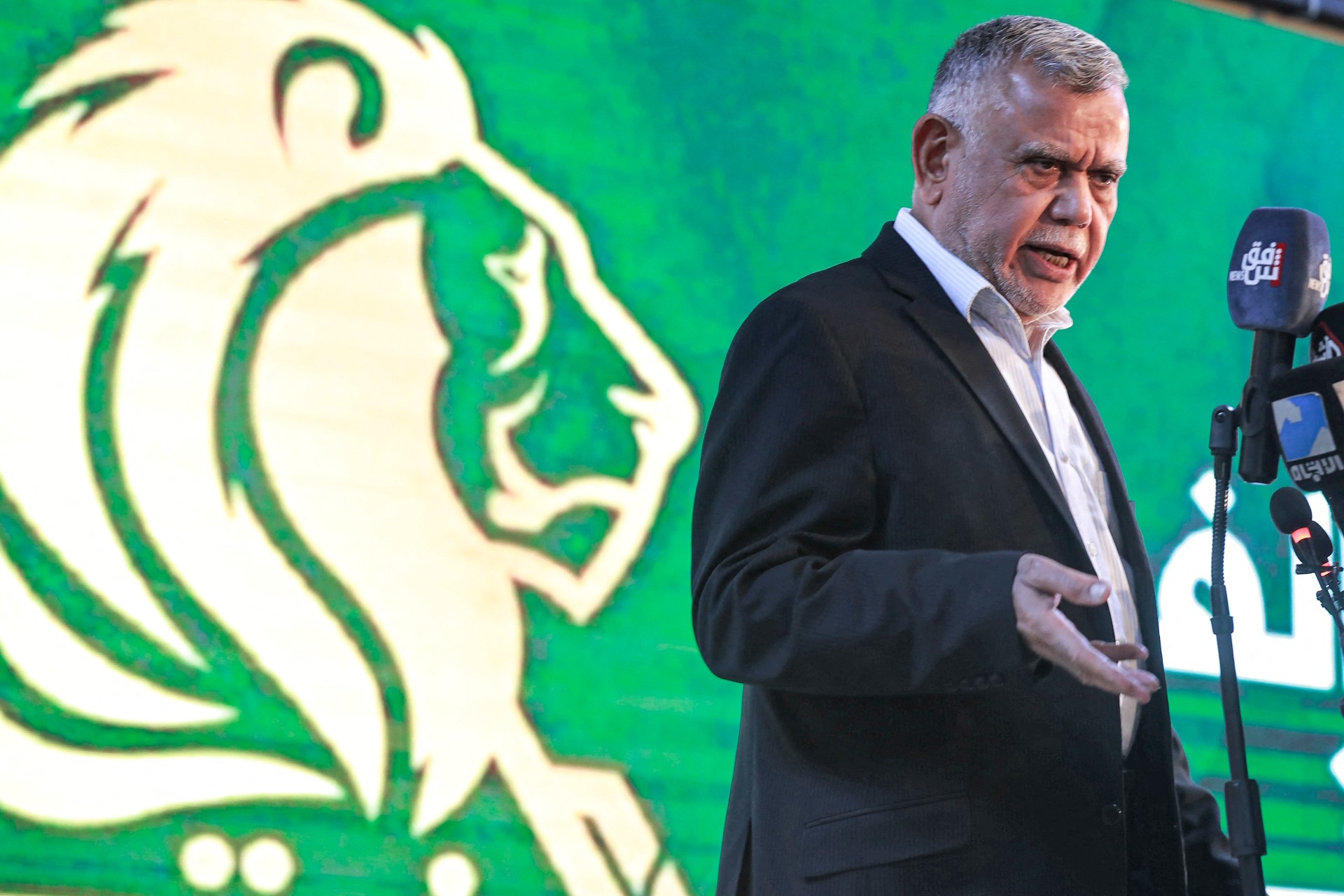
Earlier this month, the British ambassador in Iraq was received by an angry host.
Hadi al-Amiri, head of the Iran-backed Fatah alliance of Shia political forces, invited Mark Bryson-Richardson to meet him, following several meetings the Iraqi politician and his allies had been holding with foreign diplomats that week.
Amiri and his colleagues in the Coordination Framework, a Shia political alliance, had been sounding out foreign embassies as they sought a way to form a new Iraqi government. Those meetings had largely been cordial, but Bryson-Richardson’s visit on 2 April was rather more spikey. The Fatah leader accused the UK ambassador of “continued interference” in the political situation, citing alleged intelligence information about British efforts to destabilise Iraqi politics.
A source close to Amiri described the meeting as "hot" and told Middle East Eye that the Fatah leader spoke "directly" of a "conspiracy" led by the British to "extract power from Shia".
'The project is not new, but the British have finally found someone who aligns with them and implements it'
- Shia leader close to Amiri
The accusation was that Britain has been encouraging influential Shia cleric Muqtada al-Sadr and his allies to form a “majority government” that would sideline various Iran-backed factions and impose a new political order on Iraq.
New MEE newsletter: Jerusalem Dispatch
Sign up to get the latest insights and analysis on Israel-Palestine, alongside Turkey Unpacked and other MEE newsletters
Since 2003, Iraqi parties have ruled on a power-sharing basis that has given all the major players a say. In October’s parliamentary elections, however, the Iran-backed factions performed poorly, giving Sadr the opportunity to form a government excluding them.
Such an outcome is viewed not as a loss of influence by the major Shia factions, but rather as an existential issue, Shia leaders told MEE. The factions accuse the UK and US of encouraging Sadr and his Sunni and Kurdish allies to pursue the policy, one they say Washington and London have been plotting for years.
"The project is not new, but the British have finally found someone who aligns with them and implements it," a leader close to Amiri said.
“The Coordination Framework leaders’ meetings with ambassadors were aimed at asking some of them to stop supporting Sadr and his allies, and to warn them of the consequences of proceeding with such a project,” he added.
“The inevitable result of the project that Sadr is espousing is civil war and partition. But then everyone will pay the price, and the damage will not be limited to Iraq alone.”
MEE asked several British diplomats in Baghdad for comment, without response.
Playing the 'godfather'
Sadr’s project has come unstuck. His Sairoon Alliance clearly won the October elections, and soon after the results began coming through the cleric built an alliance with Sunni parties under Speaker Mohammed al-Halbousi and the Kurdistan Democratic Party (KDP).
But the Coordination Framework, wary of losing its parties’ influence and financial and economic gains, managed to form a “blocking third” of MPs. This has prevented a quorum being reached in parliament and a new president voted in, which would open the door for a government to be formed.
Frustrated, Sadr has removed himself from the political scene for 40 days, telling his rivals that they can try forming a government instead. But he nonetheless appears to remain committed to his project.
Sadr’s people and backers describe his plan as a broom, something that can sweep away the dirt and clean up Iraqi politics. His opponents prefer to liken it to a pottery crammed with fragile ceramics, which can tip into each other and shatter if disturbed.
Some Shia leaders close to Sadr prefer another analogy: The Godfather, Mario Puzo’s 1969 crime novel. Like the novel’s fictional Corleone mafia family, Sadr, his supporters say, has the necessary power and clout to bring the Shia factions under his control - whether by encouragement or intimidation. Shia political leaders supportive of his project said he can gradually “politically and militarily” terminate the factions, seize their property and money, and even legitimise their work.
"The project aims to control the longstanding chaos by replacing dozens of militia leaders and organised crime gangs that currently control the political and security scene in Iraq with one leadership, one militia and one gang," a prominent Shia leader told MEE.
“Sadr has the largest parliamentary bloc and millions of followers, in addition to one of the largest Shia militias, and a financial empire whose annual revenues exceed the budget of some small countries,” he added.
'Halbousi and Barzani are not expected to rebel against the British. As for Sadr, if he thinks of rebellion, massive demonstrations are enough to bring him down'
- Liberal Shia leader close to Sadr
“Therefore, he is the most suitable person to play the role of godfather, or broom that will sweep away these groups.”
Shia leaders from both camps told MEE that this project was originally suggested and developed by the British in 2018, and is not limited to Iraq’s Shia.
“It is designed to extend to the Sunni and Kurdish arenas,” a prominent political leader close to Nouri Al-Maliki, Sadr’s chief rival in the Coordination Framework, told MEE. "The British were the first who suggested this, to get rid of gangs and armed factions.”
Shia political leaders say the alleged project requires a leader from each major religious/ethnic group to implement it. Sadr was chosen from the Shia forces, Halbousi from the Sunnis, and former president of Iraq’s semi-autonomous Kurdistan region Massoud Barzani is the Kurdish representative.
"[From the British point of view] if only these three remain at the front, it will be easier to control them,” a liberal Shia leader close to Sadr told MEE. “Halbousi and Barzani are not expected to rebel against the British. As for Sadr, if he thinks of rebellion, massive demonstrations are enough to bring him down."
Attempts to thwart the Sadr project
There is no evidence that the British are behind Sadr’s project. When it comes to foreign influence in Iraq, the United States and Iran are far more powerful. Yet the British are nonetheless believed to have played a pivotal role in several major decisions in Iraq since 2003.
They enjoy good relations with most of the Shia forces, particularly the Sadrists, who receive British training and advice, according to several sources from across the political divide, including senior officials.
But despite previously good relations, tensions between the British and the Iran-backed Shia factions began boiling over when Jaafar al-Sadr, Sadr's cousin and brother-in-law, was appointed Iraqi ambassador to the UK in November 2019.
Jaafar al-Sadr has emerged as his cousin’s pick to be the next prime minister, and his nomination last month was considered by Muqtada’s rivals as “tangible evidence” that he and the British are “seriously seeking to eliminate them”.
Yet the Coordination Framework’s “blocking third” has stopped the constitutional process of electing a president, prime minister and government in its tracks, and Sadr’s temporary political time out has given his rivals a chance to lobby foreign embassies to reject his plan. Ambassadors of the UK, several EU countries and Egypt were their first ports of call.
But the Coordination Framework is facing much the same problem as Sadr did. It cannot achieve a quorum in parliament, and rocket attacks and vicious media diatribes against Sadr’s allies have undermined any chance of compromise.
Coordination Framework leaders said it was in fact the United States that suggested the Shia alliance communicate with foreign embassies to help “moisten” the atmosphere and pave the way for negotiations with the Kurdish and Sunni blocs.
"Things have gotten very complicated and everyone has been sluggish for months, and none of the conflicting parties succeeded in imposing their project,” a Coordination Framework leader close to Maliki told MEE. “To break the situation and negotiate according to new rules of engagement, we need an international initiative or a way out to reduce tension and break this political blockage.
“All local, regional and international players must take a step back, and to achieve this, we thought that asking the ambassadors to be involved is a must.”
Officials at the US embassy refused to comment on the allegations.
US and Iran share concerns
Unusually, Iran has for the most part had little involvement in Iraq’s government-formation process. Political leaders close to Iran told MEE that Tehran has been happy to watch the developments play out without extending its allies a helping hand, because it wanted to punish its allied armed factions for violating orders and staging attacks without prior coordination.
A few weeks ago, the Iranian calculations changed, however. The political leaders said Iran began to tip the balance against Sadr by ensuring none of the Coordination Framework’s factions broke off to join the cleric’s project.
It also began putting pressure on some regional players, such as Qatar, the UAE, Turkey, Egypt and Russia, to change their positions regarding the negotiations to form the Iraqi government, the leaders said.
But saving the Shia factions of the Coordination Framework is not the goal the Americans and Iranians had in mind.
The PUK, a major Kurdish party which has good relations with Tehran and Washington and is the KDP’s main rival, is the US and Iran’s main concern - three Coordination Framework leaders, a prominent PUK official and a senior Iraqi official close to the US told MEE.
The PUK has traditionally held the federal presidency since 2005, but if Sadr’s alliance is able to reach a quorum, it will almost certainly vote in a president from the KDP and the PUK will lose huge amounts of influence.
"There is no Iranian-American agreement on this detail, but the PUK is an important ally for both of them, and the priority of the two now is to save this ally," a prominent Shia leader familiar with the ongoing talks told MEE.
"The candidate of the Sadr alliance for president is from Barzani's party. If this candidate wins the presidency, this will be the end of the PUK,” he added.
“From the Iranians’ point of view, this is a big and explicit threat to their interests, and from the US’s point of view, this is a disruption of the political and social balance in the Kurdistan region. So the two sides intervened, each in their own way. So far, they have succeeded.”
Middle East Eye delivers independent and unrivalled coverage and analysis of the Middle East, North Africa and beyond. To learn more about republishing this content and the associated fees, please fill out this form. More about MEE can be found here.


